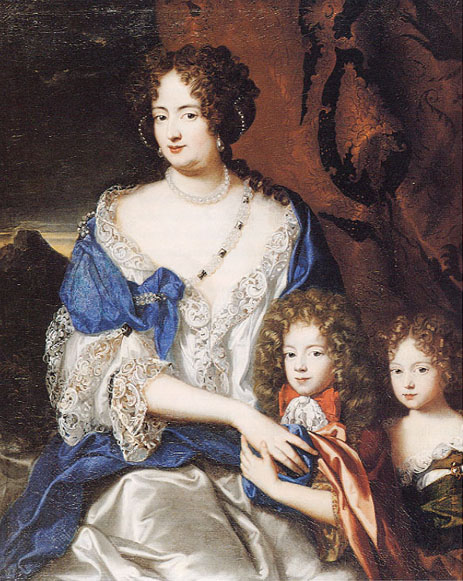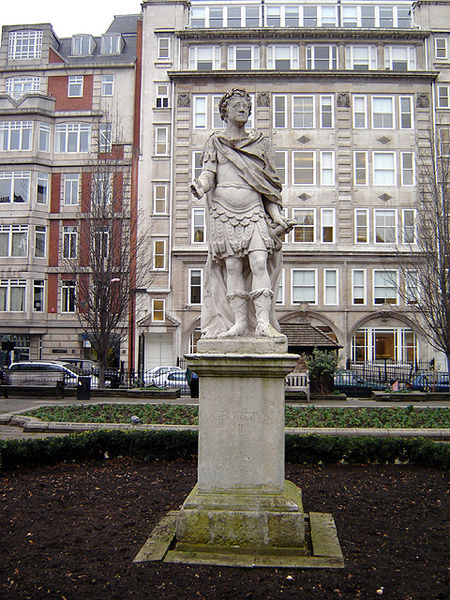<Back to Index>
- Astronomer Laurentius Paulinus Gothus, 1565
- Writer Oliver Goldsmith, 1730
- King of Great Britain and Ireland George II, 1683
PAGE SPONSOR
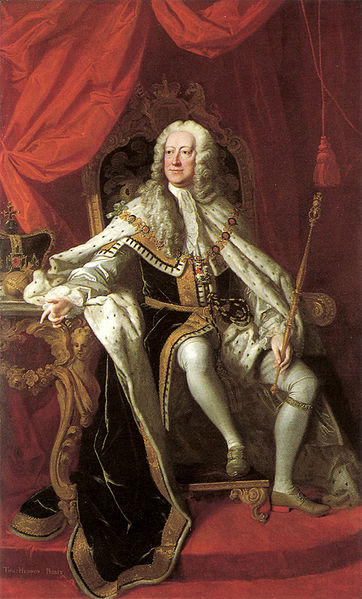
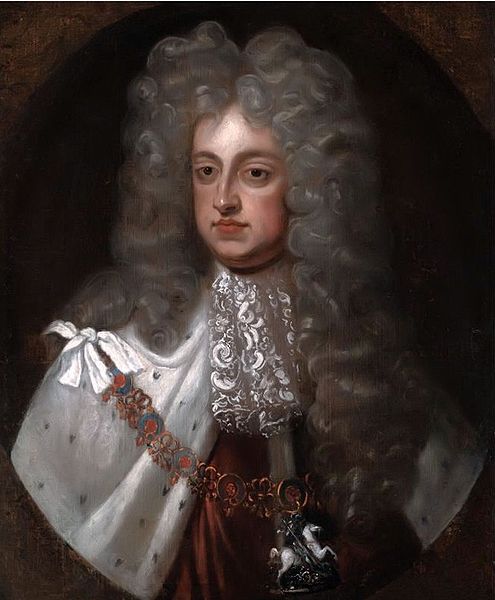
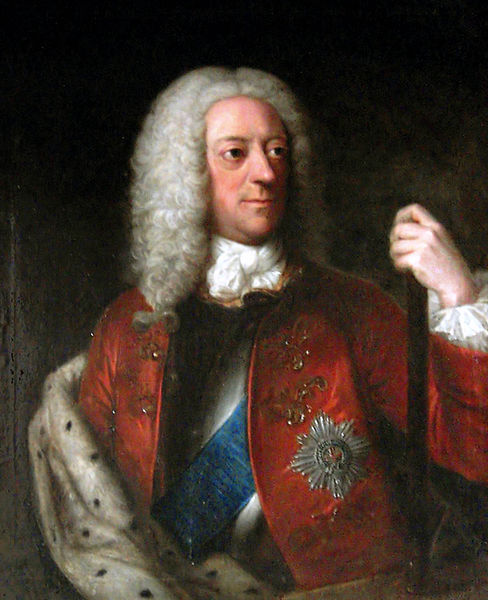
George II (George Augustus; German: Georg II. August; 10 November 1683 – 25 October 1760) was King of Great Britain and Ireland, Duke of Brunswick - Lüneburg (Hanover) and Archtreasurer and Prince-elector of the Holy Roman Empire from 11 June 1727 until his death.
He
was the last British monarch to have been born outside Great Britain,
and was famous for his numerous conflicts with his father and,
subsequently, with his son. As king, he exercised little control over
policy in his early reign, the government instead being controlled by
Great Britain's parliament. Before that, most kings possessed great
power over their parliaments. He was also the last British monarch to
lead an army in battle (at Dettingen,
in 1743). Although he primarily spoke German,
as well as French,
as his first languages like his father George I, he was also very
fluent in English (unlike George I) as well as Latin, Dutch,
and Spanish.
HH Duke Georg August of
Hanover was born at Herrenhausen
Palace, Hanover (Germany). He was the son
of Georg Ludwig (the future King George I of
Great Britain) then the Hereditary Prince of Brunswick -
Lüneburg, and his wife, Sophia of Celle;
both George and Sophia committed adultery but Sophia's alleged
abandonment of George led to their being divorced in 1694. Queen Anne,
who had ascended the thrones of England, Scotland and Ireland in 1702,
made George an English citizen in 1705, a Knight of the
Garter in 1706, and
gave him the titles of Duke of
Cambridge, Earl of Milford Haven, Viscount Northallerton and
Baron Tewkesbury. In 1708 he
participated in the Battle
of Oudenarde and fought in
the vanguard; he was thrown off his horse but survived unharmed. On 22
August 1705 in Hanover, George married Margravine
Caroline of Brandenburg - Ansbach.
An intelligent and attractive woman, she had been a much sought after
bride. Caroline was one of the Princesses considered for the Spanish
crown, but had refused because it would have meant giving up her
Protestant faith for Catholicism. Another princess suggested as a bride
was Princess Hedvig
Sophia of Sweden, at the time
Dowager Duchess and regent of Holstein
- Gottorp, but she declined
the match. George
was given the title of the Prince of Wales upon the ascension of his
father as King of the United Kingdom of Great Britain and Ireland in
1714. The Prince of Wales had an extremely poor relationship with his
father. When the Princess of Wales gave birth to Prince George
William in 1717,
a family quarrel ensued; at the baptism,
the Prince of Wales insisted on having the Duke of
Newcastle (whom the
king detested) as a godfather,
whilst the King chose his brother, the Duke of York
and Albany. When he publicly vituperated his father, the Prince
of Wales was temporarily put under arrest.
Afterwards, the King banished his son from St. James's
Palace, the King's residence, and excluded him from all public
ceremonies. Having
been banned from the Royal Palace and shunned by his own father, the
Prince of Wales did all in his power to encourage opposition to George I's
policies for the next several years, which included measures designed
to increase religious freedom in Great Britain and expand Hanover's
German territories at the expense of Sweden. His London residence,
Leicester House, became a frequent meeting place for his father's
political opponents, including Sir Robert Walpole and Viscount
Townshend.
In 1720, Walpole encouraged the King and his son to reconcile. In the
same year, Walpole made a return to political office, from which he had
been excluded since 1717 by George I. In 1721, the economic disaster of the South
Sea Bubble allowed Sir Robert Walpole to rise to the
pinnacle of government. Walpole and his Whig Party were dominant in politics, for George
I feared that the Tories would not support the succession laid
down in the Act
of Settlement.
The power of the Whigs was so great that the Tories would not come to
hold power for another half-century. Sir Robert essentially controlled
British government, but, by joining the King's side, he lost the favour
of the Prince of Wales. George
II succeeded to the throne on his father's death on 11 June 1727, but a
battle of wills continued with his son and heir apparent, Prince
Frederick. George was crowned at Westminster
Abbey on 4
October. The Hanoverian composer Handel was commissioned to write
four new anthems for the coronation; one of which, Zadok the Priest,
has been sung at every coronation since. It
was widely believed both that George would dismiss Walpole, who had
distressed him by joining his father's government, and that he would be
replaced by Sir Spencer
Compton;
George requested Compton, rather than Walpole, to write his first
speech for him. Sir Spencer, however, requested Walpole for aid in the
task, leading Queen Caroline, an ardent supporter of Sir Robert, to
claim that Compton was incompetent. George did not behave obstinately;
instead, he agreed with his wife and retained Walpole as Prime
Minister, who continued to slowly gain royal favour, securing a generous civil list of £800,000 for the
King. He
also persuaded many Tory politicians to accept the succession laid down
in the Act of Settlement as valid. In turn, the King helped Sir Robert
to gain a strong parliamentary majority by creating peers sympathetic to the Whigs. While
the Queen was still alive, Walpole's position was secure. He was the
master of domestic policy, and he still exerted some control over
George's foreign policy. Whereas the King was eager for war in Europe,
the Prime Minister was more cautious. Thus, in 1729, he encouraged
George to sign a peace treaty with Spain. In 1732, by granting a charter to James
Oglethorpe, the King created
the Province
of Georgia in British
America, which was named
after him. In 1737 he founded the University
of Göttingen in Germany, also named after him. George
II's relationship with his son, the Prince of Wales, worsened during
the 1730s. When the Prince of Wales married, an open quarrel broke out;
the King banished him and his family from the royal court in 1737 much
like the punishment George II's father brought upon him. After
banishing his son, George II also lost his wife, who died on 20
November 1737. Reputedly, when she asked her husband to remarry when
she passed on, he replied, "Non, j'aurai des maîtresses!" (French
for "No, I shall have mistresses!"). Reputedly, she replied "Ah, mon
Dieu, cela n'empeche pas." ("My God, that doesn't prevent it.") George
II had already had an illegitimate son, Johann Ludwig,
Graf von Wallmoden - Gimborn by
his mistress Amalie von
Wallmoden, Countess of Yarmouth. The most famous of his
mistresses was Henrietta
Howard, Countess of Suffolk, who was one of Caroline's ladies of the
bedchamber.
Against
Walpole's advice, George once again entered into war, the War of Jenkins'
Ear, with Spain in 1739. The entire continent of Europe was
plunged into war upon the death of the Holy Roman Emperor Charles VI in 1740. At dispute was the
right of his daughter, Maria Theresa,
to succeed to his Austrian dominions. George II's war with Spain
quickly became part of the War of the
Austrian Succession. Sir
Robert Walpole was powerless to prevent a major European conflict. He
also faced the opposition of several politicians, led by John,
Baron Carteret,
later Earl Granville. Accused of rigging an election, Walpole retired,
in 1742, after over twenty years in office. He was replaced by Spencer
Compton, 1st Earl
of Wilmington,
George's original choice for the premiership, who had previously failed
to gain office due to the manoeuvres of Queen Caroline. Lord
Wilmington, however, was a figurehead; actual power was held by Lord
Carteret. When Lord Wilmington died in 1743, Henry
Pelham took
his place. The pro-war faction was led by Lord Carteret, who claimed
that if Maria Theresa failed to succeed to the Austrian Throne, then
French power in Europe would increase. George agreed to send more
troops to Europe, ostensibly to support Maria Theresa, but in reality
to prevent enemy troops from marching into Hanover. The British army
had not fought in a major European war in over twenty years, during
which time the government had badly neglected its upkeep. Nevertheless,
the King enthusiastically sent his troops to Europe. He personally
accompanied them, leading them into the Battle
of Dettingen in
1743, thus becoming the last British monarch to lead troops into
battle. His armies were controlled by his military minded son, The
Duke of Cumberland.
The war was not welcomed by the British public, who felt that the King
and Lord Carteret were subordinating British interests to Hanoverian
ones. Shrewdly,
George's French opponents encouraged rebellion by the Jacobites during the War of the
Austrian Succession. The Jacobites were the supporters of the Roman
Catholic James II,
who had been deposed in 1688 and replaced, not by his Catholic son, but
by his Protestant daughter. James II's son, James Francis
Edward Stuart, known as the
Old Pretender to
the Hanoverian supporters and called "The True King" by the Jacobites,
had attempted two prior rebellions; that of 1715, "the Fifteen",
which was after he fled to France; and the rebellion of 1719, "the Nineteen",
which was so weak that it was almost farcical. The Old Pretender's son, Charles Edward
Stuart, popularly known as Bonnie
Prince Charlie, led the most famous rebellion on his father's
behalf in 1745. Bonnie
Prince Charlie landed in Scotland in July 1745. Many Scots were loyal
to his cause; he defeated British forces in September. He then
attempted to enter England, where even Roman Catholics seemed hostile
to the invasion. The French monarch, Louis XV,
had promised to send twelve thousand soldiers to aid the rebellion, but
did not do so. The Jacobites retreated back into Scotland. On 16 April
1746, Bonnie Prince Charlie faced the Duke of Cumberland in the Battle of
Culloden, the last pitched battle ever
fought on British soil. The ravaged Jacobite troops were routed by the
British Government Army. Bonnie Prince Charlie escaped to France, but
many of his Scottish supporters were caught and executed. Jacobitism
was all but crushed; no further serious attempt was made at restoring
the House of Stuart. After
the Forty-Five, the War of the Austrian Succession continued. Peace was
made in 1748, with Maria Theresa being recognised as Archduchess of
Austria. She subsequently dropped Great Britain as a key ally, deeming
it too unreliable.
For
the remainder of his life, George did not take any active interest in
politics or war. During his last years, the foundation of the Industrial
Revolution was
laid as the population rose rapidly. British dominance in India
increased with the victories of Robert Clive at the Battle of Arcot and the Battle of
Plassey. When
the Prince of Wales died suddenly in 1751, his son, Prince George
immediately succeeded him as Duke of Edinburgh. The new Duke was soon
created Prince of Wales in recognition of his status as heir-apparent.
However, the Dowager
Princess of Wales mistrusted
the King, and kept the two apart. In
1752, Great Britain reformed its calendar.
It had previously operated under the Julian Calendar,
but during 1752 adopted the Gregorian
Calendar.
The calendar change required omitting eleven days; 2 September was
followed by 14 September. Furthermore, 1 January became the official
beginning of the New Year, instead of 25 March. The former date had
been commonly regarded as the beginning of the New Year for a long
time, but the latter was retained in formal usage. To ensure
consistency of financial record keeping, and to prevent annual payments
falling due before they would have under the Julian Calendar, the
fiscal year was not shortened, with the result that in the United
Kingdom each tax year has since begun on 6 April. In 1754, King George issued the charter
for King's College in New York City, which would later become Columbia
University after the American
Revolution. George's Prime
Minister, Henry
Pelham, died in 1754, to be
succeeded by his brother, the Duke
of Newcastle - upon - Tyne,
and, thereafter, by the Duke
of Devonshire in 1756. Another notable minister was William
Pitt the Elder. Pitt was
appointed a Secretary of State in the Duke of Devonshire's
administration, but was disliked by the King,
for he had previously opposed involvement in the War of the Austrian
Succession. The hostility was marked by George's criticism of Pitt's
speeches in early 1757. In April of the same year, George dismissed
Pitt, but later recalled him. At the same time, the Duke of Newcastle
returned as Prime Minister. As Secretary of
State for the Southern Department, Pitt guided policy relating
to the Seven Years' War,
which may be viewed as a continuation of the War of the Austrian
Succession. Maria Theresa, Archduchess of Austria, made an alliance
with her nation's former enemies, Russia and France, and became the
enemy of Great Britain and Hanover. George II feared that this new
alliance would invade
Hanover;
thus, he aligned himself with Prussia. Great Britain, Hanover and
Prussia were thus pitted against many major European powers, including
Austria, Russia, France, Sweden and Saxony.
The war spread from Europe to North America (where the conflict is also
known as the French and
Indian War) and to India, where it was termed the Second Carnatic
War.
Britain enjoyed an Annus
Mirabilis in 1759 which saw British forces
triumphant in every theatre in which they fought including the capture
of Quebec, Guadeloupe and the defeat of the French army in
Germany at the Battle
of Minden. A French plan
to invade Britain was defeated following the naval battles
at Lagos and Quiberon
Bay. On the morning of 25
October 1760,
the King entered his water closet and, after a few minutes, his valet
heard a loud crash. He entered the water closet to find the King on the
floor. The King was lifted into his bed, and asked for Princess
Amelia, but before she
reached him, he was dead. A post mortem revealed that the King had died
of a ruptured aneurysm of the aorta. He was subsequently buried in Westminster
Abbey and was succeeded by his grandson (son of
Prince Frederick, who had died nine years earlier), who became George
III.
